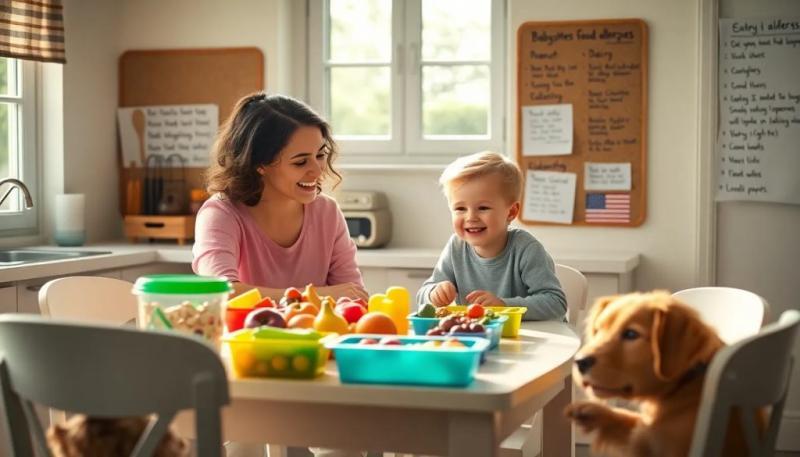When parents with children who have food allergies hire babysitters, it is crucial to ensure that caregivers are well-informed and prepared. Understanding how babysitters track food allergies can make a significant difference in keeping children safe. In this article, we will explore essential guidelines and best practices for babysitters and caregivers when managing food allergies in children.
Training for babysitters and caregivers
Proper training for babysitters is a fundamental step in ensuring the safety of children with food allergies. It is essential to provide caregivers with comprehensive information about the specific allergies and anaphylaxis risks that a child may face. This training can include recognizing signs of allergic reactions and administering an EpiPen when necessary.
Moreover, caregivers should be educated on the importance of safety measures, such as reading ingredient labels and understanding cross-contamination. By equipping babysitters with this knowledge, parents can have peace of mind knowing their child is in capable hands.
- Educate caregivers on various food allergies.
- Provide training on using EpiPens and emergency procedures.
- Encourage babysitters to ask questions and clarify doubts.
- Share resources that outline potential food allergy triggers.
6 essential rules for babysitting a child with severe allergies
Babysitting a child with severe allergies requires adherence to specific rules to ensure safety. Here are six essential guidelines that caregivers should follow:
- Always verify the child's allergy list before meal preparation.
- Keep allergenic foods out of reach and away from the child's area.
- Encourage the use of pre-approved snacks only.
- Communicate clearly with parents about food restrictions.
- Understand how to respond in case of an allergic reaction.
- Maintain an environment free of allergens during care.
How do babysitters track food allergies?
The question of how babysitters track food allergies is vital for the safety of children. Effective tracking often begins with open communication between parents and caregivers. Parents should provide detailed information about their child's allergies, including a list of foods to avoid and potential symptoms of an allergic reaction.
Many parents find it helpful to prepare a food allergy babysitting form, which outlines necessary information. This form usually includes contact details for emergency services, specific allergy triggers, and instructions for administering medication like an EpiPen. Caregivers can use this form to ensure they have all critical information at hand.
Regular check-ins and discussions about dietary changes or new foods introduced in the child's diet are also crucial. This ongoing communication helps babysitters stay informed and vigilant regarding any updates regarding the child's allergies.
Why is it important for babysitters to understand food allergies?
Understanding food allergies is not just important; it's vital for the health and safety of allergic children. Caregivers who are well-versed in this topic can better recognize symptoms of allergic reactions, which can sometimes escalate rapidly into anaphylaxis.
Moreover, babysitters who comprehend the seriousness of food allergies are more likely to take necessary precautions to avoid exposure. This knowledge fosters a safer environment where children can play and interact without unnecessary risks.
- Knowledge reduces the risk of accidental exposure.
- Informed babysitters can act quickly in case of emergencies.
- Educated caregivers provide peace of mind for parents.
What steps should parents take before hiring a babysitter for an allergic child?
Before hiring a babysitter for a child with food allergies, parents should take several proactive steps. First, they should conduct thorough interviews with potential caregivers, focusing on their experience with food allergies and emergency response procedures.
Additionally, parents should provide written documentation of the child's allergies, including an allergy action plan. This plan should outline the steps to take in case of an allergic reaction, emphasizing the importance of having this information readily available.
Inviting the babysitter to meet the child in a controlled setting can also be beneficial. This allows the caregiver to ask questions and allows parents to assess their comfort level with the babysitter.
How can babysitters effectively manage food allergies during care?
Effective management of food allergies requires vigilance and preparation. Babysitters should always check ingredient labels on foods that may be served. This step is critical to avoid any accidental exposure to allergens.
Additionally, caregivers should implement a strict “no outside food” rule during their care. This rule helps to minimize risks associated with unverified food items. Caregivers should also encourage children to communicate their needs and any concerns they might have during snacks or meals.
- Always have emergency contacts readily available.
- Know the location of the nearest hospital.
- Practice administering an EpiPen in case of an emergency.
- Keep the child's allergy action plan accessible.
What are the emergency procedures babysitters should know for allergic reactions?
In the event of an allergic reaction, babysitters must be prepared to act swiftly. The first step is to recognize the symptoms, which can include hives, swelling, difficulty breathing, or gastrointestinal distress.
If a reaction occurs, the caregiver should immediately reach for the child's EpiPen and administer it as per the instructions outlined in the allergy action plan. Following this, it is crucial to contact emergency services for further assistance.
Babysitters should also stay with the child until help arrives, monitoring their condition closely and providing reassurance. This calm demeanor can be vital in reducing the child's anxiety during a distressing situation.
How can communication between parents and babysitters ensure safety for allergic children?
Clear communication between parents and babysitters is essential for effectively managing food allergies. Parents should share comprehensive information about their child's allergies, emergency plans, and any recent changes in their dietary needs.
Moreover, establishing a regular check-in schedule can help keep lines of communication open. This practice allows parents to maintain an awareness of their child’s experiences and any issues that might arise during care.
Babysitters should feel encouraged to ask questions, voice concerns, and provide feedback about their experiences. This collaborative approach helps ensure that both parties are aligned in keeping the child safe.
Questions related to managing food allergies
How do daycares handle food allergies?
Daycares typically implement strict policies to manage food allergies. Most require parents to provide written documentation of allergies and dietary restrictions. Staff are often trained in recognizing allergic reactions and administering emergency care.
Additionally, daycares may have specific procedures in place to prevent cross-contamination, such as dedicated food preparation areas for allergic children. These measures ensure a safer environment for all children enrolled.
Is food allergy considered personal data?
Yes, food allergies are often considered personal data, especially under privacy regulations. This classification means that daycares and babysitters must handle this information with confidentiality and care.
Parents should be aware of their rights regarding the sharing of this information and ensure that caregivers understand the importance of confidentiality when managing food allergies.
Who is responsible for carrying out food allergies?
The responsibility of managing food allergies primarily lies with both parents and caregivers. Parents must inform caregivers about their child's specific allergies and provide clear guidelines and resources.
On the other hand, babysitters and caregivers are responsible for implementing these guidelines during their care. They must ensure that children are safe and understand their own dietary restrictions.
What are babysitters responsible for?
Babysitters are responsible for providing a safe environment for children, especially those with food allergies. This includes monitoring what children eat and ensuring that allergenic foods are kept away.
Additionally, caregivers must be prepared to respond effectively in case of an allergic reaction, following the outlined action plans and contacting emergency services when necessary.
For further insights on managing food allergies, check out this informative video:


